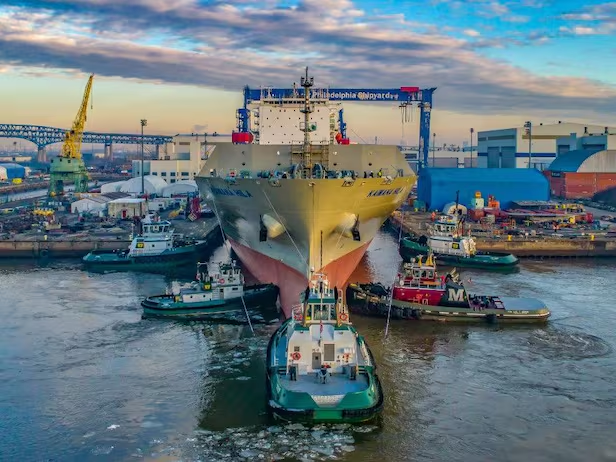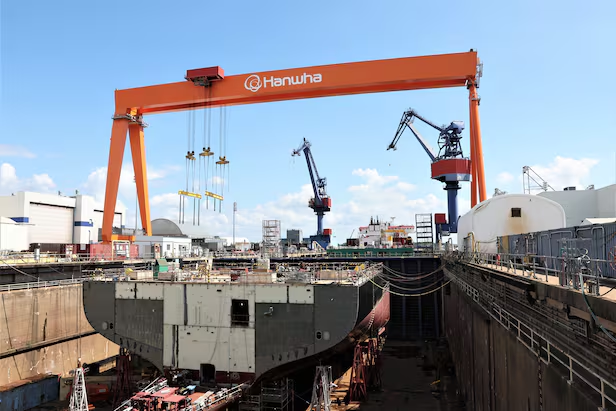More than half a year after being acquired by Hanwha Group, Hanwha Philly Shipyard has yet to end its years of losses. As the shipyard continues to invest funds and manpower to upgrade its outdated facilities, it is expected that it will take some time before it can achieve profitability.

Hanwha Philly Shipyard reported an operating loss of 29.2 billion won (US$21 million) in the second quarter of 2025, a further increase from the 2 billion won loss in the first quarter. The shipyard has been in the red for seven consecutive years since 2018 and is expected to struggle to turn a profit this year.
Hanwha Systems, a subsidiary of Hanwha Group, reported a 58% year-on-year decrease in operating profit of 33.5 billion won (approximately US$24 million) in the second quarter, driven by widening losses at Hanwha Philly Shipyard. Its quarterly operating profit margin fell 7.9 percentage points from 12.3% in the same period last year. Hanwha Systems explained that the significant decrease in operating profit was due to the recognition of costs that had not been accounted for prior to the acquisition of Hanwha Philly Shipyard.
At the end of 2024, Hanwha Group completed the acquisition of Philly Shipyard for approximately US$100 million and renamed it Hanwha Philly Shipyard. Since then, Hanwha Systems has been committed to improving the production efficiency of Hanwha Philly Shipyard and optimizing the shipbuilding process. Currently, it has significantly reduced the assembly time for ship hull modules and is converting idle facilities at the shipyard into assembly and production areas.
Hanwha Philly Shipyard recently secured US$72 million in investment for upgrades to its docks and shipbuilding process automation. Currently, the yard primarily operates Docks 4 and 5, which are used for shipbuilding and mooring, respectively. The yard plans to restore Dock 5’s production capacity and increase the annual capacity of Docks 4 and 5 to three to four vessels, bringing the total annual capacity to eight to ten vessels, a significant increase from the current annual capacity of approximately 1.5 vessels.

The industry expects normalized spending at Hanwha Philly Shipyard to continue in the second half of this year. Hanwha Ocean is currently sending employees to Philadelphia for technical training and education. The company plans to train 200 personnel annually through Hanwha Philly Shipyard’s academy, aiming to increase the number of available production personnel from the current 1,500 to over 3,000.
At the same time, Hanwha Ocean is promoting a job rotation program for Hanwha Philly Shipyard employees to Korea, with the aim of strengthening shipbuilding capabilities by allowing Hanwha Philly Shipyard employees to accumulate high value-added shipbuilding experience, thereby entering the field of liquefied natural gas (LNG) carrier construction.
Currently, Hanwha Philly Shipyard has begun to see results from its efforts to improve production efficiency. Recently, the yard launched the Acadia, the first US subsea rock installation vessel, five months ahead of schedule, in December 2025. Originally scheduled for delivery in the fourth quarter of 2024, the vessel had been delayed for several years. However, with the acquisition, the vessel’s construction progress has accelerated, resolving delivery issues.
Hanwha Philly Shipyard has received a new order for one LNG carrier, the first such vessel built in the United States in 45 years. The first vessel is expected to be delivered in the first half of 2028. Each vessel is priced at approximately US$250 million, comparable to prices at Asian shipyards.
This type of LNG carrier does not comply with the Jones Act and will be built under a joint construction model, with Hanwha Philly Shipyard signing the main shipbuilding contract and execute the contract in partnership with Hanwha Ocean. Since Hanwha Philly Shipyard lacks the facilities to build LNG carriers, “a significant portion” of the construction work will be carried out at Hanwha Ocean’s Geoje Shipyard in South Korea, but Hanwha Philly Shipyard will be responsible for US regulatory compliance and safety certification.
Hanwha Group plans to continue to secure shipbuilding contracts in the United States market through this type of partnership between Korean and American shipyards. In addition to its commercial shipbuilding business, Hanwha Group is expected to secure United States shipbuilding orders, including newbuild projects, through Hanwha Philly Shipyard.


